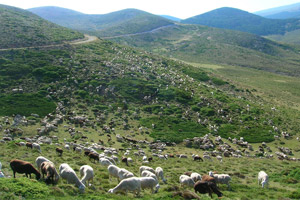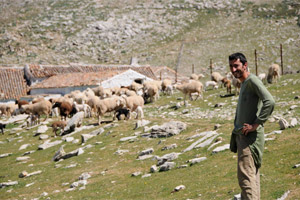EFNCP at the EU Sheep Meat Forum
Advocating improved policy design and implementation, as well as environmental commitments from the sector.

Sheep grazing mosaics of grasslands and shrublands at the Moncayo Natural Park, in Spain (Photo: Juan San Vicente)
Over the last 12 months, EFNCP has been taking part in the "EU Sheep Meat Forum", a series of four workshops organised by the European Commission at the initiative of Phil Hogan, European Commissioner for Agriculture and Rural Development, to explore current and future challenges of the EU sheep meat sector.
The first three workshops covered economic, social and environmental aspects of sheep farming in the EU, trade and food supply challenges, promotion initiatives and overall policies for the sheep sector. The series was completed by a fourth workshop held on 13 October 2016 to finalise conclusions and identify key issues for future work.

Young farmer from Malaga (Spain) who contributes to wildfire prevention targets by grazing his sheep in fuelbreak areas. (Photo: Rogelio Jiménez)
In our understanding, sheep production can have both negative and positive environmental effects, as most farming sectors. However, sheep farming systems stand out particularly for their potentially beneficial effects over large areas of territory, on marginal farmland that is mostly composed of semi-natural vegetation and is environmentally fragile.
At its best, sheep farming can contribute to many important environmental targets, but for this to happen, policy design and implementation need to be improved, so as to offer adequate support and incentives for sheep farmers producing most environmental benefits. Unfortunately, this is not the case nowadays, with large areas of HNV farmland excluded from CAP direct payments, like in Spain and Greece, while in places like Romania, sheep farming seems to be excessively favoured, disrupting traditional management of biodiversity-rich mountain hay meadows.
Building on our recent policy work on wood pastures, including the Wood Pastures Manifesto signed by over 135 organisations, and on past analyses of the sheep sector, EFNCP produced a specific paper for this EU Sheep Meat Forum. Throughout the meetings, EFNCP representatives advocated higher environmental commitments from the sector, and an enabling policy framework from EU institutions.
Download EFNCP Contribution to the Conclusions of the EU Sheep Meat Forum
Back to news overview


